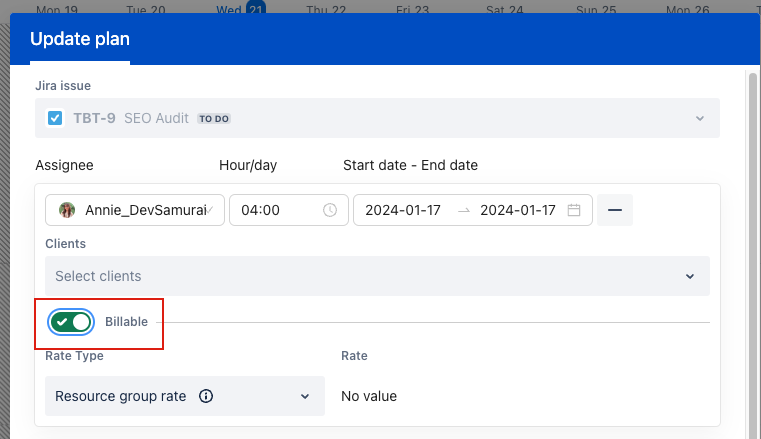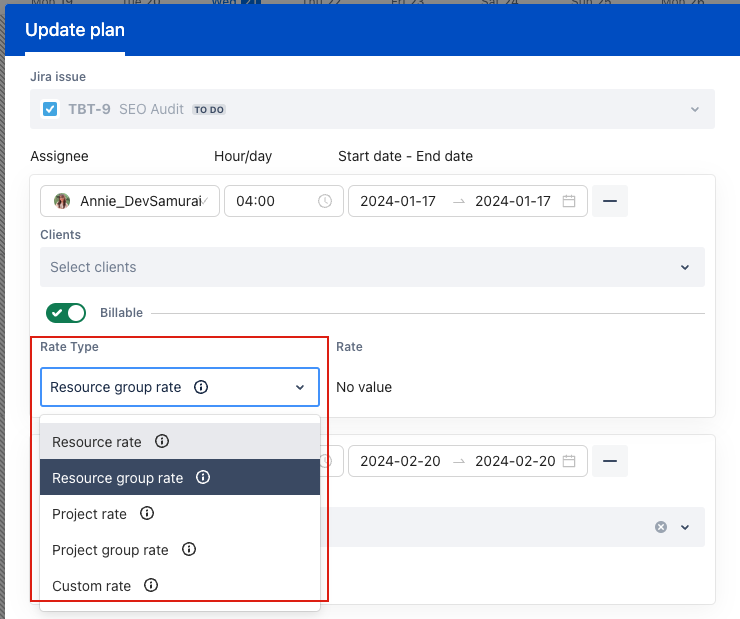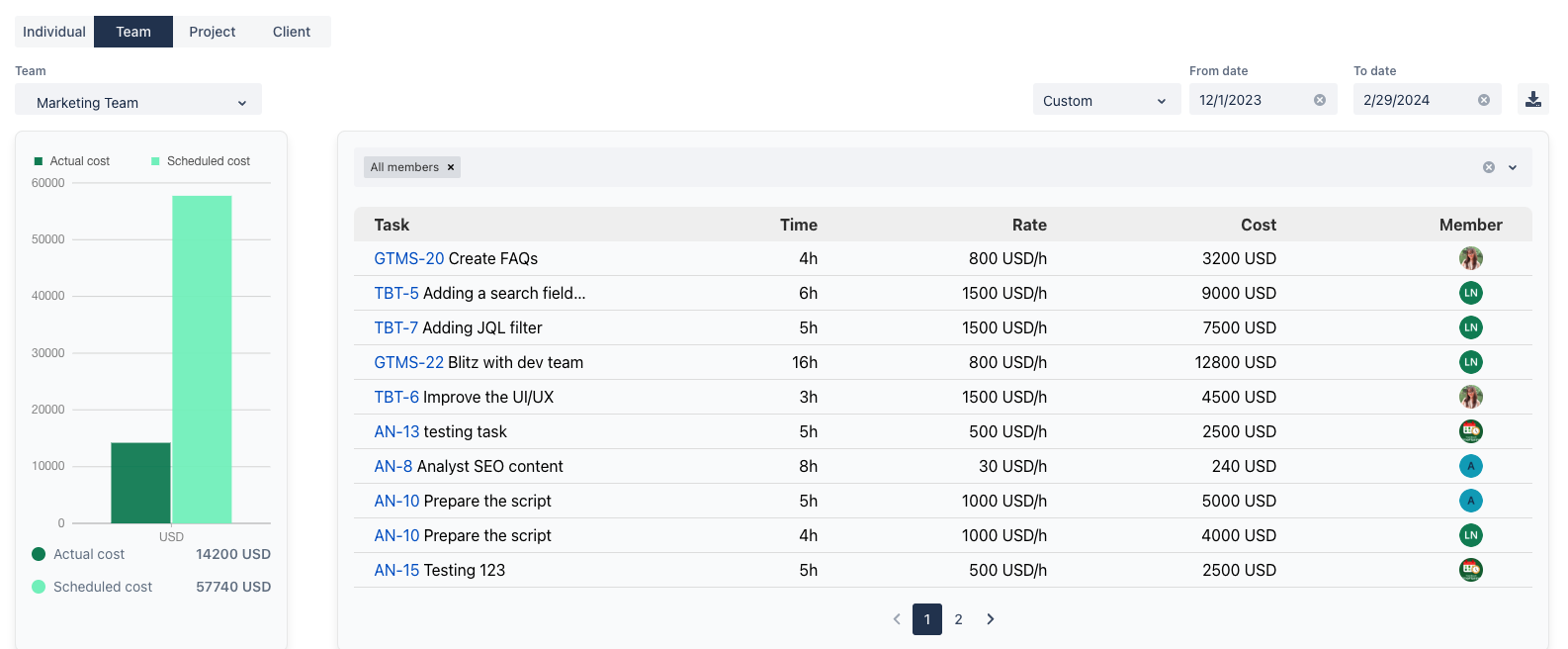Community resources
Community resources
Community resources
Guide #5: How to Track Costs in Jira | Jira Cost Tracking 💰
Hello Community 👋 Let's kick off the week with a Cost Management solution of TimePlanner via this article 👇
In our last discussion, we discussed how to log time in Jira and uncovered its critical role in increasing project transparency. Today, let's explore how Jira cost tracking with the help of TimePlanner transforms project management challenges into opportunities for efficiency and innovation.
![]()
Understanding how to track costs in Jira is more than just a skill. It's a requirement in the fast-paced world of project management, where every choice counts and every penny matters. With a focus on simplicity and practicality, we hope to demystify Jira cost tracking, making it accessible to everyone, regardless of expertise level.
But, why is cost control so important, and how might TimePlanner help? Embark on this journey and you will get the answer right away
💰 Understanding Jira Cost Tracking
Cost tracking in Jira is about more than simply keeping spending under control; it's about getting the most out of every dollar spent on your projects. It includes planning, estimating, budgeting, and cost control to ensure that your project is executed within the allocated budget.
What is Cost Tracking?
Cost monitoring is a methodical way to planning and controlling a project or business's budget. In the context of Jira, it is critical in giving project managers and teams the insights and tools they need to track project expenses, allocate resources efficiently, and make informed financial decisions.
The Benefits of Jira Cost Tracking
Jira cost tracking, as a critical component of effective Jira cost management, involves the ongoing monitoring of project expenses. Since we keep tracking the costs spent, we will have a chance to compare actual costs against budgeted costs. From there, project managers will be able to analyze variances to make informed financial decisions. This explains why leveraging Jira cost tracking tools like TimePlanner for cost tracking offers several advantages, including:
- Enhanced Budget Accuracy: By methodically recording every project-related expense, TimePlanner gives an unsurpassed level of budget management precision. This accuracy aids in minimizing overpaying and allows project managers to distribute funds more effectively, ensuring that financial resources are channeled toward high-priority tasks and assets.
- Improved Decision Making: Project managers benefit greatly from having access to real-time financial data. TimePlanner allows you to swiftly examine the financial health of your projects, spot trends, and make proactive changes. This immediate information aids strategic decision-making, enabling quick decisions that can guide your project toward financial efficiency and success.
- Increased Transparency: One of the most significant benefits of utilizing TimePlanner for Jira expense tracking is the transparency it provides to project finances. Stakeholders, ranging from team members to external clients, have a clear awareness of how resources are distributed, the costs associated with each decision, and the project's overall financial position. This transparency builds trust and allows for more effective conversation about budgetary issues.
- Better Financial Planning: With thorough tracking and reporting capabilities, TimePlanner provides project managers with the tools they need for accurate financial forecasts. Managers who understand current spending patterns and historical financial performance may better estimate future expenses, plan for contingencies, and guarantee that projects are financially sustainable from start to finish.
📊 How to Track Costs in Jira Using TimePlanner?
TimePlanner makes controlling project finances seem simple. Imagine working on Jira cost tracking for tasks and resources with a few clicks. Then you can easily set up billing rates, and receive transparent cost reports that provide clear insights at a glance. Plus, with TimePlanner, you're not simply reacting to budget deviations; you're staying ahead of the curve, ensuring your projects stay on track and within budget. And the best part? It integrates easily with Jira, making expense monitoring a hassle-free element of your project management routine.
To harness the full potential of TimePlanner in managing costs, we'll divide the process into three main sections: Cost Planning, Billing Rates, and Cost Reports.
Cost Planning
Cost Planning is the foundation of effective cost tracking. TimePlanner enhances this process by allowing:
- Task-Based Cost Planning: Assign costs directly to tasks within the "Schedule" board. This granularity aids in meticulous budget management. To do this, users as billing admins just need to enable/disable the “Billable” toggle.

- Resource-Based Cost Planning: Specify costs per resource when assigning tasks. This not only helps with workload management but also with financial oversight.
Billing Rates
Setting up billing rates is crucial for accurate cost allocation. To set up the rate and cost, the administrator needs to access the Billing Rate functionality in TimePlanner. When choosing rate type for a task, you can consider 5 options:
- Resource rate: Determines the cost of an individual resource.
- Resource group rate: Sets a rate for a group of resources.
- Project rate: Applies a rate for a single project.
- Project group rate: Establishes a rate for multiple projects.
- Custom rate: Allows for a task-specific rate beyond the standard categories.

Cost Reports
The cost reports feature provides a full overview of your Jira cost tracking process for the project, including both expected and actual prices for your tasks and resources. This dual perspective allows project managers to quickly assess the project's budget adherence and financial performance.
TimePlanner improves Jira project management by generating full billing reports for resources, teams, projects, and clients, revealing both scheduled and real charges for complete financial transparency. Users can receive specialized insights by filtering these reports by certain time ranges. Furthermore, the platform's exporting capabilities in both Excel and CSV formats enable sharing and analyzing this critical financial data simply and quickly. Eventually, it improves communication and decision-making processes.
 An example of a Jira cost tracking report for your project
An example of a Jira cost tracking report for your project
💡Tips to Handle Jira Cost Tracking Effectively
The following useful advice can help you get the most out of using TimePlanner for Jira cost tracking:
- Implement Continuous Monitoring: Create a daily or weekly cost tracking routine to identify variances early.
- Set up budget threshold alerts in TimePlanner to notify you when costs approach the budget limit.
- Prioritize High-Cost Areas: For better control, concentrate on the parts of your project that cost the most money.
- Streamline Cost Approval Processes: Establish a streamlined process for approving expenses and project scope changes.
- Integrate Jira cost tracking tools: Use TimePlanner's integration capabilities with other financial tools to get a more complete picture.
- Cost-benefit analyses should be conducted on a regular basis to justify expenditures.
- Proactive Budget Adjustment: Be prepared to make budget adjustments based on project progress and financial information.
- Encourage Financial Literacy: Teach your team about financial principles and the impact of their work on the project budget.
- Historical data can be used to forecast future project budgets in TimePlanner.
- Encourage Open Financial Communication: Create an environment in which financial concerns and ideas can be freely discussed.
- Implement Cost-Saving Initiatives: Identify and implement cost-cutting strategies without sacrificing quality.
- Benchmark Against Industry Standards: To improve efficiency, compare your project's cost performance to industry benchmarks.
- Optimize Vendor and Contractor Costs: Conduct regular contract reviews and negotiations to ensure competitive rates.
- Non-billable hours should be tracked to understand their impact on project profitability.
- Analyze Return on Investment (ROI): Determine the financial return on project expenses in order to guide future spending.
Conclusion
Finally, mastering Jira cost tracking with TimePlanner is an essential skill for project managers and outsourced professionals who want to succeed with their projects. The tactics and procedures presented, which range from constant monitoring to lowering vendor prices, provide a comprehensive approach to efficiently and effectively managing project funds. Implementing these approaches will ensure that any project you manage not only meets its financial goals, but also provides the most value to stakeholders.
👉 Get a free 30-trial of TimePlanner on Atlassian Marketplace
Was this helpful?
Thanks!
Emily _ DevSamurai
0 comments